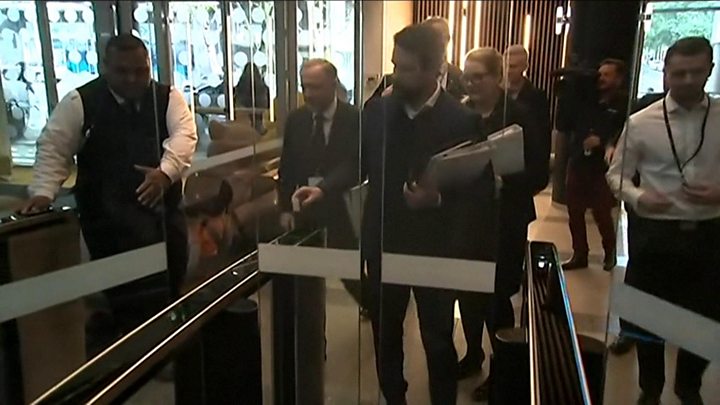 The company's chief rival, Nine - publisher of the Sydney Morning Herald and The Age - ran similar front pages.
The company's chief rival, Nine - publisher of the Sydney Morning Herald and The Age - ran similar front pages.
 ABC managing director David Anderson said: "Australia is at risk of becoming the world's most secretive democracy."
On Sunday, the Australian government reiterated it was possible that three journalists may face prosecution in the wake of the raids.
Prime Minister Scott Morrison said press freedom was important to Australia's democracy, but added the "rule of law" needed to be upheld.
"That includes me, or any journalist, or anyone else,'' he said on Sunday.
ABC managing director David Anderson said: "Australia is at risk of becoming the world's most secretive democracy."
On Sunday, the Australian government reiterated it was possible that three journalists may face prosecution in the wake of the raids.
Prime Minister Scott Morrison said press freedom was important to Australia's democracy, but added the "rule of law" needed to be upheld.
"That includes me, or any journalist, or anyone else,'' he said on Sunday.
 Media captionPolice raided Australia's public broadcaster earlier this year
The findings of a press freedom inquiry will be tabled in parliament next year.
Media captionPolice raided Australia's public broadcaster earlier this year
The findings of a press freedom inquiry will be tabled in parliament next year.
What do the media organisations want?
The campaign argues that tougher security laws enacted over the past two decades have threatened investigative journalism, eroding the public's "right to know". Since new counter-espionage legislation was introduced last year, media outlets have lobbied for journalists and whistleblowers to be given exemptions to report sensitive information. This forms part of a list of seven demands put to the government on Monday which also call for reforms to freedom of information and defamation laws.
Unusual allies
Jay Savage, Australia editor, BBC News Online You wouldn't typically expect Australian media chiefs to shelve their competitive instincts - if not occasional hostilities - to publish identical messages on their most prized news pages and bulletins. But the police raids had an immediate galvanising effect on the nation's press, stirring them into a co-ordinated response. Some have described the unity as unprecedented. The firms have sought to nullify possible criticisms of self-interest by arguing that Australian society is best served by more open scrutiny. They argue Australia is weaker than comparable democracies at protecting whistleblowers and has unfairly strong defamation laws which effectively silence reporting. Together the outlets wield significant power, but it remains to be seen if their demands will be met.DISCLAIMER: The Views, Comments, Opinions, Contributions and Statements made by Readers and Contributors on this platform do not necessarily represent the views or policy of Multimedia Group Limited.
Latest Stories
-
We have enough funds to pay accruing benefits; we’ve never missed pension payment since 1991 – SSNIT
16 mins -
Let’s embrace shared vision and propel National Banking College – First Deputy Governor
52 mins -
Liverpool agree compensation deal with Feyenoord for Slot
59 mins -
Ejisu by-election: There’s no evidence of NPP engaging in vote-buying – Ahiagbah
1 hour -
Ejisu by-election: Independent ex-NPP MP’s campaign team warns party against dubious tactics
1 hour -
ZEN Petroleum supports Tse-Addo Future Leaders School
2 hours -
NPP must win back Adentan seat in 2024 polls – Obeng Fosu
2 hours -
PPA Clarification: The dark side of the World Bank’s ‘giveaways’ in Ghana by Bright Simons
3 hours -
Blinken says China helping fuel Russian threat to Ukraine
4 hours -
MHA declares May as Purple Month for Mental Health Awareness
4 hours -
WAEC arrests former headmaster over illegal students registration
5 hours -
MeToo founder Tarana Burke defiant after Harvey Weinstein ruling
5 hours -
Be alert, insist on decent messages – Dwumfour tells media
5 hours -
Father jailed 10 years for burning daughter’s genitals with hot cutlasses
5 hours -
I aim to help Ghana produce world-class athletes – Asamoah Gyan
6 hours

